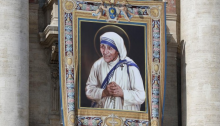During Canonization Mass, Pope Francis Suggests to Some 120,000 Faithful to Carry Her Smile in Their Hearts
“I think, perhaps, we may have some difficulty in calling her “Saint Teresa”: her holiness is so near to us, so tender and so fruitful that we continual to spontaneously call her ‘Mother Teresa.'”
Pope Francis deviated from his prepared text to say this during his homily at the canonization of Blessed Mother Teresa, held in St. Peter’s Square this morning.
In his homily, Francis prayed, “May this tireless worker of mercy help us increasingly to understand that our only criterion for action is gratuitous love, free from every ideology and all obligations, offered freely to everyone without distinction of language, culture, race or religion.”
Mother Teresa loved to say, he recalled: ‘Perhaps I don’t speak their language, but I can smile.’
“Let us carry her smile in our hearts and give it to those whom we meet along our journey, especially those who suffer. In this way, we will open up opportunities of joy and hope for our many brothers and sisters who are discouraged and who stand in need of understanding and tenderness.”
God’s Will in Our Lives
The Holy Father also had the some 120,000 gathered for the canonization think about their own lives: “Our task is to perceive the call of God and then to do his will. But in order to do his will, we must ask ourselves, “What is God’s will in my life?”
He reminded them that, in order to ascertain the call of God, we must ask ourselves and understand what pleases God.
“God is pleased by every act of mercy,” he said, “because in the brother or sister that we assist, we recognize the face of God which no one can see (cf. Jn 1:18). Each time we bend down to the needs of our brothers and sisters, we give Jesus something to eat and drink; we clothe, we help, and we visit the Son of God (cf. Mt 25:40).”
Given this, the Jesuit Pontiff urged all faithful to translate that which they invoke in prayer and profess in faith into concrete acts.
No Alternative to Charity
“There is no alternative to charity: those who put themselves at the service of others, even when they don’t know it, are those who love God (cf. 1 Jn 3:16-18;Jas 2:14-18).”
However, he warned, the Christian life “is not merely extending a hand in times of need.” If it is just this, Francis warned, it can certainly still be “a lovely expression of human solidarity which offers immediate benefits, but it is sterile because it lacks roots.”
On the contrary, the Pope underscored, the task which the Lord gives us is the ‘vocation to charity.’
“Following Jesus is a serious task, and, at the same time, one is filled with joy; it takes a certain daring and courage to recognize the divine Master in the poorest of the poor and to give oneself in their service,” he said, adding: “In order to do so, volunteers, who out of love of Jesus serve the poor and the needy, do not expect any thanks or recompense; rather they renounce all this because they have discovered true love.”
Dispenser of Divine Mercy
“Mother Teresa, in all aspects of her life,” the Holy Father reflected, “was a generous dispenser of divine mercy, making herself available for everyone through her welcome and defense of human life, those unborn and those abandoned and discarded.”
“She was committed to defending life, ceaselessly proclaiming that “the unborn are the weakest, the smallest, the most vulnerable.”
Continuing to applaud the little sister, Francis noted, “She bowed down before those who were spent, left to die on the side of the road, seeing in them their God-given dignity; she made her voice heard before the powers of this world, so that they might recognize their guilt for the crime of poverty they created.”
Mercy Was Her ‘Salt’ and ‘Light’
For Mother Teresa, Francis explained, mercy was the “salt” which gave flavor to her work, it was the “light” which shone in the darkness of the many who no longer had tears to shed for their poverty and suffering.
“Her mission to the urban and existential peripheries remains for us today an eloquent witness to God’s closeness to the poorest of the poor,” he said.
Today, the Pontiff prayed, “I pass on this emblematic figure of womanhood and of consecrated life to the whole world of volunteers: may she be your model of holiness!”
Teresa’s Journey to Sainthood
In a private meeting with Cardinal Angelo Amato, prefect of the Congregation for the Causes of Saints, in the Vatican months ago, Pope Francis authorized the Congregation for the Causes of Saints to promulgate a decree regarding a miracle attributed to the intercession of Blessed Teresa, known as Mother Teresa around the world.
Born Aug. 26, 1910, Agnes Gonxha Bojaxhiu would go on to found the Congregation of the Missionaries of Charity and the Missionaries of Charity. The order, which started in Calcutta and spread to more than 130 countries, ran hospices for those suffering from HIV/AIDS, leprosy, and tuberculosis. Known for her charitable works with the poor and sick, the soon to be canonized saint, died on Sept. 5, 1997.
Immediately following her death in 1997, the Catholic Church began her process of beatification. She was beatified by St. John Paul II in 2002, following the recognition of the miraculous healing of an Indian woman suffering from a tumor in her abdomen. Yesterday, Pope Francis signed off on the second miracle needed, which, according to the newspaper of the Italian bishops’ conference, L’Avvenire, regarded a man in Brazil in 2008 who had multiple brain abscesses, and who, within a day of being in a coma, was cured.
***
On ZENIT’s Web page:
Pope’s Homily: https://zenit.org/articles/pope-francis-homily-at-canonization-of-blessed-teresa/
Full Translation of Angelus Address: https://zenit.org/articles/popes-angelus-address-at-canonization-of-mother-teresa/
Source: Zenit


